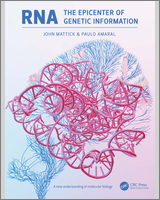NCBI Bookshelf. A service of the National Library of Medicine, National Institutes of Health.
Mattick J, Amaral P. RNA, the Epicenter of Genetic Information: A new understanding of molecular biology. Abingdon (UK): CRC Press; 2022 Sep 20.

RNA, the Epicenter of Genetic Information: A new understanding of molecular biology.
Show details
John Mattick is Professor of RNA Biology at UNSW Sydney. He earned his PhD in Biochemistry at Monash University in Melbourne and undertook his postdoctoral training at Baylor College of Medicine in Houston. Most recently, he was the Chief Executive of Genomics England, Executive Director of the Garvan Institute of Medical Research in Sydney and Director of the Institute for Molecular Bioscience, the Australian Genome Research Facility, the ARC Special Research Centre for Molecular and Cell Biology and the ARC Special Research Centre for Functional and Applied Genomics at the University of Queensland.
His research interests have been focused for the past three decades on the role of regulatory RNAs in the evolution and development of complex organisms. He pioneered the thesis that the majority of the genome of humans and other complex organisms, previously considered to be ‘junk’, is devoted to regulatory RNAs that direct the epigenetic trajectories of differentiation and development. He has published more than 300 research articles and reviews, which have been cited over 85,000 times. His work has received editorial coverage in Nature, Science, Scientific American, New Scientist and The New York Times. It has also been highlighted in two books: The Deeper Genome by John Parrington and Promoting the Planck Club by Don Braben.
He has received numerous awards including the International Union of Biochemistry and Molecular Biology Medal, the University of Texas MD Anderson Cancer Center Bertner Award for Distinguished Contributions to Cancer Research, and the Human Genome Organization Chen Medal for Distinguished Achievement in Human Genetics and Genomic Research. He is a Fellow of the Australian Academy of Science, the Royal Society of New South Wales, the Australian Academy of Technology and Engineering and the Australian Academy of Health and Medical Sciences. He is also an Associate Member of the European Molecular Biology Organization.

Paulo Amaral is Assistant Professor of Bioengineering at Insper in São Paulo, Brazil. He earned a BSc in Biological Sciences (University of Brasília), MSc in Biochemistry at the Institute of Chemistry, University of São Paulo, and PhD in Molecular Genetics at the Institute for Molecular Bioscience, University of Queensland, in Brisbane. He undertook his postdoctoral work at the CRUK/Wellcome Trust Gurdon Institute and Milner Therapeutics Institute, University of Cambridge, supported by a Royal Society and British Academy Newton International Fellowship, Corpus Christi College Research Fellowship and Borysiewicz Biomedical Sciences Fellowship.
He has also taught at different institutions as a visiting lecturer at both the undergraduate and graduate levels, including at the Karolinska Institutet and Uppsala University in Sweden, and Humanitas University and Università Campus Bio-Medico di Roma in Italy. Since 2004, his research has explored the roles of non-coding DNA, regulatory RNAs and RNA modifications in a variety of biological systems, in both academia and industry. He was one of the first to show that non-coding RNAs associate with chromatin and guide chromatin modifications for gene activation, and has been a longstanding student of the history of molecular biology, especially of the overlooked middleman, but almost certainly the key player, RNA.
- Authors - RNA, the Epicenter of Genetic InformationAuthors - RNA, the Epicenter of Genetic Information
Your browsing activity is empty.
Activity recording is turned off.
See more...